 The obsessive pursuit of health is itself unhealthy. We can locate ourselves at the enjoyment of health end of the spectrum or we can pursue disease. There are many influences in our lives that lead us unconsciously to pursue disease. To consciously choose the enjoyment of health we must recognize and resist these influences. Read more
The obsessive pursuit of health is itself unhealthy. We can locate ourselves at the enjoyment of health end of the spectrum or we can pursue disease. There are many influences in our lives that lead us unconsciously to pursue disease. To consciously choose the enjoyment of health we must recognize and resist these influences. Read more
Category Archives: Health & Medicine
From healthism to overdiagnosis
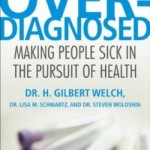 To be fair, many of these experts may be true believers, people who want to do everything they can not to miss anyone who could possibly benefit from diagnosis. But the fact that there is so much money on the table may lead them to overestimate the benefits and ignore the harms of overdiagnosis. These decisions affect too many people to let them be tainted by the businesses that stand to gain from them. Read more
To be fair, many of these experts may be true believers, people who want to do everything they can not to miss anyone who could possibly benefit from diagnosis. But the fact that there is so much money on the table may lead them to overestimate the benefits and ignore the harms of overdiagnosis. These decisions affect too many people to let them be tainted by the businesses that stand to gain from them. Read more
Megan McArdle: Why are there no new antibiotics?
 She goes on to discuss some of the issues involved in getting pharmaceutical companies to develop desparately needed new antibiotics. In particular, she explains the need to create a stockpile of new antibiotics that everyone will agree not to use for many years. (If we did use them, resistance would develop almost immediately.) This will mean some people (thousands? tens of thousand?) will die during the waiting period, when they could have lived. (Good luck on that one.) Someone (the government? foundations?) must agree to pay the pharmaceutical companies for all those years of waiting. And the US – for various reasons – will have to do this first. Read more
She goes on to discuss some of the issues involved in getting pharmaceutical companies to develop desparately needed new antibiotics. In particular, she explains the need to create a stockpile of new antibiotics that everyone will agree not to use for many years. (If we did use them, resistance would develop almost immediately.) This will mean some people (thousands? tens of thousand?) will die during the waiting period, when they could have lived. (Good luck on that one.) Someone (the government? foundations?) must agree to pay the pharmaceutical companies for all those years of waiting. And the US – for various reasons – will have to do this first. Read more
Are the most heavily marketed drugs the least beneficial?
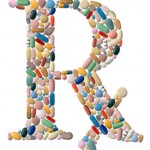 In a perfect world, doctors would not prescribe – and patients would not take – drugs that do more harm than good. But it’s complicated. The benefits and harms of drugs are determined in randomized, controlled clinical trials. For many reasons, the outcomes of such trials may not provide doctors with the information they need to decide who should take what. Read more
In a perfect world, doctors would not prescribe – and patients would not take – drugs that do more harm than good. But it’s complicated. The benefits and harms of drugs are determined in randomized, controlled clinical trials. For many reasons, the outcomes of such trials may not provide doctors with the information they need to decide who should take what. Read more
It’s cheaper to let the sick die
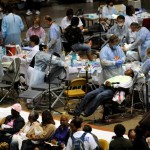 Unfortunately, he [Gawande] dismisses what, from the standpoint of reducing total health-care expenditures, is the single most serious drawback to such an approach; namely, the probability that effectively case-managed patients will survive longer than they would without intensive ambulatory care and will thereby offset their reduced frequency of hospitalization with an increase in their time at risk. If an intervention reduces a patient’s frequency of hospitalization from ten admissions annually to five, but simultaneously increases that patient’s survival from one year to two, the intervention is fully justified medically but is a wash from a cost perspective. If it increases that patient’s survival to two years and one month, it’s a net liability. Read more
Unfortunately, he [Gawande] dismisses what, from the standpoint of reducing total health-care expenditures, is the single most serious drawback to such an approach; namely, the probability that effectively case-managed patients will survive longer than they would without intensive ambulatory care and will thereby offset their reduced frequency of hospitalization with an increase in their time at risk. If an intervention reduces a patient’s frequency of hospitalization from ten admissions annually to five, but simultaneously increases that patient’s survival from one year to two, the intervention is fully justified medically but is a wash from a cost perspective. If it increases that patient’s survival to two years and one month, it’s a net liability. Read more
Complaints about pharma go way back … to ancient Rome
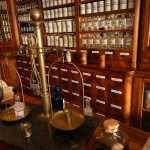 In 1911 the medical profession complained of the “commercialization” of medicine, contending that this led to abuses in pharmacology and the practice of medicine. The Romans failed to check these abuses, which increased as Rome declined. “[I]f we are to avoid such unfortunate deterioration in our own time, we must not shrink from recognizing and resisting the evils which do so easily beset commercialized ages like those of the first and twentieth centuries A. D.” Read more
In 1911 the medical profession complained of the “commercialization” of medicine, contending that this led to abuses in pharmacology and the practice of medicine. The Romans failed to check these abuses, which increased as Rome declined. “[I]f we are to avoid such unfortunate deterioration in our own time, we must not shrink from recognizing and resisting the evils which do so easily beset commercialized ages like those of the first and twentieth centuries A. D.” Read more
Don’t drink and judge: Bitter tastes and moral disgust
 Although the mechanisms linking taste and behaviour are not yet clear, the authors [of the study] ask whether jurors should avoid bitter tastes and whether food preferences play a role in shaping political ideals. Read more
Although the mechanisms linking taste and behaviour are not yet clear, the authors [of the study] ask whether jurors should avoid bitter tastes and whether food preferences play a role in shaping political ideals. Read more
Overdiagnosed and overprotected children
 We have to really listen and think about why a child is telling us something. The behaviour of children and young people is fundamental to a well-functioning society, because they can tell us what is going on more honestly than we tell ourselves. Read more
We have to really listen and think about why a child is telling us something. The behaviour of children and young people is fundamental to a well-functioning society, because they can tell us what is going on more honestly than we tell ourselves. Read more
Why do we feel bad about the way we look?
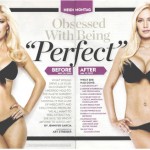 How did ordinary women and men with ordinary lives and ordinary bodies learn that they need plastic? The answer: the plastic ideological complex, a set of cultural texts that are both highly contested and yet tightly on message. It is itself so ubiquitous that it might even be described as hegemonic. In other words, the “need” for cosmetic procedures is impossible to avoid. Through advertising and TV shows, movies and magazines, we learn to want cosmetic intervention in our aging faces and imperfect bodies. This need is now so firmly implanted in our cultural psyche that it has become “common sense” to embrace cosmetic procedures. Read more
How did ordinary women and men with ordinary lives and ordinary bodies learn that they need plastic? The answer: the plastic ideological complex, a set of cultural texts that are both highly contested and yet tightly on message. It is itself so ubiquitous that it might even be described as hegemonic. In other words, the “need” for cosmetic procedures is impossible to avoid. Through advertising and TV shows, movies and magazines, we learn to want cosmetic intervention in our aging faces and imperfect bodies. This need is now so firmly implanted in our cultural psyche that it has become “common sense” to embrace cosmetic procedures. Read more
Doctors eliminate the middle man: Insurance
 The real beauty of direct-pay primary care is not only that it’s attractive to patients. It can be a way for struggling primary care physicians to maintain a financially viable practice. The average patient pays $700 to $800 a year for membership. According to a report from Kaiser Health News, this is three times more than a doctor makes for each patient in an insurance-based practice. Not to mention the extra time and the absence of aggravation that comes when doctors eliminate insurance companies. Read more
The real beauty of direct-pay primary care is not only that it’s attractive to patients. It can be a way for struggling primary care physicians to maintain a financially viable practice. The average patient pays $700 to $800 a year for membership. According to a report from Kaiser Health News, this is three times more than a doctor makes for each patient in an insurance-based practice. Not to mention the extra time and the absence of aggravation that comes when doctors eliminate insurance companies. Read more
Surgery at a deep discount
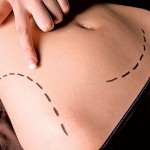 Medicine is a profession. Economically, it’s sufficiently different from other marketplace transactions that it shouldn’t be run as a for-profit business. When I made that argument in a recent post, I mentioned: “The health care market is basically not price competitive – a patient contemplating brain surgery is not going to be tempted by a surgeon offering a deep discount.” That may still be true of brain surgery, but it’s obviously not true of plastic surgery. Read more
Medicine is a profession. Economically, it’s sufficiently different from other marketplace transactions that it shouldn’t be run as a for-profit business. When I made that argument in a recent post, I mentioned: “The health care market is basically not price competitive – a patient contemplating brain surgery is not going to be tempted by a surgeon offering a deep discount.” That may still be true of brain surgery, but it’s obviously not true of plastic surgery. Read more
Are hospitals too chaotic to be safe?
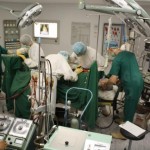 Despite the increasing understanding that clinicians routinely ignore alarms due to noise fatigue and their perceived nuisance, more vendors of monitoring equipment have responded by making their alarms louder or more irksome, hoping to out-compete related equipment by ensuring their alarm gets attention. Yet equipment alarms are not equally important and there is currently no system that prioritizes disparate alarms. Additionally, there is no incentive for a given vendor to work with its peers on this problem. The result is an “arms race” mentality that is fundamentally detrimental to the quality of patient care. Read more
Despite the increasing understanding that clinicians routinely ignore alarms due to noise fatigue and their perceived nuisance, more vendors of monitoring equipment have responded by making their alarms louder or more irksome, hoping to out-compete related equipment by ensuring their alarm gets attention. Yet equipment alarms are not equally important and there is currently no system that prioritizes disparate alarms. Additionally, there is no incentive for a given vendor to work with its peers on this problem. The result is an “arms race” mentality that is fundamentally detrimental to the quality of patient care. Read more
Robots dispense drugs and remove prostates
 The University of California, San Francisco (UCSF) has a team of robots that fills prescriptions for its medical center. Orders are submitted electronically. The drugs are retrieved from a secure, sterile environment. The dosage is as exact as a computer is logical. Medications are packaged for each patient – even assembled into 12-hour packets for the day. It eliminates possible errors by both pharmacists and nurses. Read more
The University of California, San Francisco (UCSF) has a team of robots that fills prescriptions for its medical center. Orders are submitted electronically. The drugs are retrieved from a secure, sterile environment. The dosage is as exact as a computer is logical. Medications are packaged for each patient – even assembled into 12-hour packets for the day. It eliminates possible errors by both pharmacists and nurses. Read more
Baby RB, Baby Isaiah, Baby Joseph
 The current case in the spotlight is Baby Joseph Maraachli. He suffers from a “progressively deteriorating neurological condition” of unknown origin and is in a permanent vegetative state. He is 13 months old. A court in Ontario ruled that the health center treating Baby Joseph could remove the breathing tube keeping him alive. The parents have transferred the child to a hospital in St. Louis, where he will receive a tracheotomy. Read more
The current case in the spotlight is Baby Joseph Maraachli. He suffers from a “progressively deteriorating neurological condition” of unknown origin and is in a permanent vegetative state. He is 13 months old. A court in Ontario ruled that the health center treating Baby Joseph could remove the breathing tube keeping him alive. The parents have transferred the child to a hospital in St. Louis, where he will receive a tracheotomy. Read more
Never Let Me Go: Exploitation of the young by the old
 The lackeys of capitalism compete to become employee of the month, just as the donors of Never Let Me Go take a pride in their donations. In both cases, the system has indoctrinated them so successfully that they’ve ended up perfectly willing to accept their part in an apparently unalterable scheme of things. Read more
The lackeys of capitalism compete to become employee of the month, just as the donors of Never Let Me Go take a pride in their donations. In both cases, the system has indoctrinated them so successfully that they’ve ended up perfectly willing to accept their part in an apparently unalterable scheme of things. Read more
From MD to MBA: The business of primary care
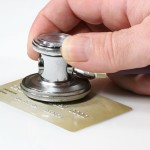 The public may not readily appreciate the adverse financial consequences of a health care system in which the majority of doctors become specialists. But it would understand the story of a primary care physician who chose to end her practice because she was undervalued, overworked, frustrated, and underpaid. Read more
The public may not readily appreciate the adverse financial consequences of a health care system in which the majority of doctors become specialists. But it would understand the story of a primary care physician who chose to end her practice because she was undervalued, overworked, frustrated, and underpaid. Read more
Even dictators need a facelift
 It’s not surprising then that Colonel Muammar Gaddafi of Libya would want to maintain a youthful appearance. His Brazilian plastic surgeon, Dr. Liacyr Ribeiro, has just released the details. Ribeiro – who has also performed cosmetic surgery on Italy’s Italian Prime Minister Silvio Berlusconi — told a Brazillian weekly that he operated on Gaddafi in 1995. Read more
It’s not surprising then that Colonel Muammar Gaddafi of Libya would want to maintain a youthful appearance. His Brazilian plastic surgeon, Dr. Liacyr Ribeiro, has just released the details. Ribeiro – who has also performed cosmetic surgery on Italy’s Italian Prime Minister Silvio Berlusconi — told a Brazillian weekly that he operated on Gaddafi in 1995. Read more
Daylight saving time and heart attacks
 1.6 billion people – almost a quarter of the world’s population – observe the biannual shifts between standard and daylight saving time. Does the loss of an hour’s sleep in the spring affect their health? According to a study published in The New England Journal of Medicine, there’s a statistically significant increase in the number of heart attacks (myocardial infarctions) in the week after we shift to daylight saving time. Read more
1.6 billion people – almost a quarter of the world’s population – observe the biannual shifts between standard and daylight saving time. Does the loss of an hour’s sleep in the spring affect their health? According to a study published in The New England Journal of Medicine, there’s a statistically significant increase in the number of heart attacks (myocardial infarctions) in the week after we shift to daylight saving time. Read more
JAMA announces new editor-in-chief
 JAMA is much more stodgy than NEJM, at least in my opinion. During the presidential election and then during the debate over health care reform, NEJM published timely commentaries on the issues and made them available online to non-subscribers. It continues to cover topics such as the legal challenges to the health care bill. Not only does JAMA give less space to these issues. Articles in JAMA are not available online without a subscription ($165 for 48 issues). Read more
JAMA is much more stodgy than NEJM, at least in my opinion. During the presidential election and then during the debate over health care reform, NEJM published timely commentaries on the issues and made them available online to non-subscribers. It continues to cover topics such as the legal challenges to the health care bill. Not only does JAMA give less space to these issues. Articles in JAMA are not available online without a subscription ($165 for 48 issues). Read more
History of patient modesty part 2: Convincing patients to disrobe
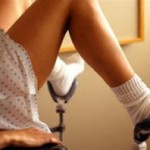 In part one of this post I explained how a new anatomical understanding of disease in the 19th century changed the practice of medicine. Prior to this insight, there was no need to expose the body to observation or to touch parts of the body that were normally clothed. The anatomical theory sent doctors on a search to discover what was happening inside the body. The new physical exam required much greater exposure and invasion of the body, a significant change for the patient experience. Read more
In part one of this post I explained how a new anatomical understanding of disease in the 19th century changed the practice of medicine. Prior to this insight, there was no need to expose the body to observation or to touch parts of the body that were normally clothed. The anatomical theory sent doctors on a search to discover what was happening inside the body. The new physical exam required much greater exposure and invasion of the body, a significant change for the patient experience. Read more
Why are there so many cosmetic surgeons?
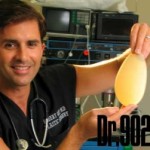 Well, one reason is that primary care physicians are being financially squeezed out of practicing their profession. There’s a good post at KevinMD on how physicians are responding, along with an acknowledgment of this sad truth in the comments. The post is called “Primary care physicians are rebelling against the system.” Read more
Well, one reason is that primary care physicians are being financially squeezed out of practicing their profession. There’s a good post at KevinMD on how physicians are responding, along with an acknowledgment of this sad truth in the comments. The post is called “Primary care physicians are rebelling against the system.” Read more
What the Internet does to the mind and self
 What we live in is not the age of the extended mind but the age of the inverted self. The things that have usually lived in the darker recesses or mad corners of our mind—sexual obsessions and conspiracy theories, paranoid fixations and fetishes—are now out there: you click once and you can read about the Kennedy autopsy or the Nazi salute or hog-tied Swedish flight attendants. But things that were once external and subject to the social rules of caution and embarrassment—above all, our interactions with other people—are now easily internalized, made to feel like mere workings of the id left on its own. Read more
What we live in is not the age of the extended mind but the age of the inverted self. The things that have usually lived in the darker recesses or mad corners of our mind—sexual obsessions and conspiracy theories, paranoid fixations and fetishes—are now out there: you click once and you can read about the Kennedy autopsy or the Nazi salute or hog-tied Swedish flight attendants. But things that were once external and subject to the social rules of caution and embarrassment—above all, our interactions with other people—are now easily internalized, made to feel like mere workings of the id left on its own. Read more
Links: Implants & cancer/Ageism & healthism/Psychiatry/Climate change/War/Inequality
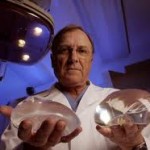 When Is Breast Cancer Not “Cancer”? When You’re Funded by Breast-Implant Makers (Bnet)
When Is Breast Cancer Not “Cancer”? When You’re Funded by Breast-Implant Makers (Bnet)
Plastic surgery trade groups advised doctors on what to tell women worried by new link between breast implants and anaplastic large cell lymphoma (ALCL). Say it’s a “condition,” not cancer.
It Gets Worse (NYT)
Robert Crawford’s healthism is alive and well. Review of Susan Jacoby’s Never Say Die: The Myth and Marketing of the New Old Age. Jacoby sees a new ageism that doesn’t just stigmatize old people for their years, but blames them for physical ills that no lifestyle adjustments or medicine could have prevented. Read more
It’s better not to have children
 Children rarely make a net contribution to a parent’s (self-assessed) levels of happiness (and remember, people tend to overestimate their happiness levels). In anonymous surveys, most parents report regretting having children. Seventy percent of people would not have had children if they knew what it would be like Read more
Children rarely make a net contribution to a parent’s (self-assessed) levels of happiness (and remember, people tend to overestimate their happiness levels). In anonymous surveys, most parents report regretting having children. Seventy percent of people would not have had children if they knew what it would be like Read more
Links: Vampire facelifts/Happiness/Neuroenhancers/Climate change/…
 ‘Vampire Face-Lifts’: Smooth at First Bite (NYT)
‘Vampire Face-Lifts’: Smooth at First Bite (NYT)
Plumping out nasiolabial folds with your own blood platelets. Not tested. Not FDA approved. “This is another gimmick that people are using to make themselves stand out on the Internet in a real dog-eat-dog part of medicine.”
The Corporate Pursuit of Happiness (Fast Company)
Stanford business school teaches students the virtues of marketing products with the promise of happiness. Happiness is just “another commodity deployed to sell something.”
Read more
History of patient modesty part 1: How bodily exposure went from unacceptable to required
 The need to reveal private and intimate parts of our bodies is a routine occurrence in medical practice today. Though it may offend our modesty, we take it for granted that the embarrassing moments of a colonoscopy, a Pap test, or a prostate exam are necessary for our health. Has it always been so? Have doctors always expected patients to disrobe? Have young male technicians always exposed the chests of female patients in need of a routine EKG? Have patients always been willing to allow doctors and their staff to view parts of the body normally seen by only the most intimate of partners? The answer is a resounding no. Read more
The need to reveal private and intimate parts of our bodies is a routine occurrence in medical practice today. Though it may offend our modesty, we take it for granted that the embarrassing moments of a colonoscopy, a Pap test, or a prostate exam are necessary for our health. Has it always been so? Have doctors always expected patients to disrobe? Have young male technicians always exposed the chests of female patients in need of a routine EKG? Have patients always been willing to allow doctors and their staff to view parts of the body normally seen by only the most intimate of partners? The answer is a resounding no. Read more
Links: Cosmetic surgery/Sleep/Aging/Health care greed/…
 Girlguiding UK urges teenage girls to think twice about cosmetic surgery (24dash)
Girlguiding UK urges teenage girls to think twice about cosmetic surgery (24dash)
UK national survey finds half of women age 16-21 would consider cosmetic surgery. More than one in 10 age 11-16 would think about cosmetic surgery to change their looks. Almost half think the pressure to look attractive is the most negative part of being female.
Culture of greed upsets attempts at health care reform (Boston Globe)
No kidding. Blue Cross CEO gets $8.6 million for leaving the company. “I am stunned by the arrogance of Blue Cross Blue Shield and the entire health insurance industry to allow this type of transfer of income from the working class to the wealthy. Read more
The duty to be happy
 By the duty to be happy, I thus refer to the ideology peculiar to the second half of the twentieth century that urges us to evaluate everything in terms of pleasure and displeasure, a summons to a euphoria that makes those who do not respond to it ashamed or uneasy. A dual postulate: on the one hand, we have to make the most of our lives; on the other, we have to be sorry and punish ourselves if we don’t succeed in doing so. This is a perversion of a very beautiful idea: that everyone has a right to control his own destiny and to improve his life. How did a liberating principle of the enlightenment, the right to happiness, get transformed into a dogma, a collective catechism? Read more
By the duty to be happy, I thus refer to the ideology peculiar to the second half of the twentieth century that urges us to evaluate everything in terms of pleasure and displeasure, a summons to a euphoria that makes those who do not respond to it ashamed or uneasy. A dual postulate: on the one hand, we have to make the most of our lives; on the other, we have to be sorry and punish ourselves if we don’t succeed in doing so. This is a perversion of a very beautiful idea: that everyone has a right to control his own destiny and to improve his life. How did a liberating principle of the enlightenment, the right to happiness, get transformed into a dogma, a collective catechism? Read more
Exploiting vanity for a good cause
 [N]ew anti-drug campaign may succeed where others have failed, grabbing teens’ attentions by appealing to their vanity. “The thinking is that this will give kids a tangible image of what can happen if they get involved in using hard drugs,” [Deputy Bret] King says. “We did want to appeal to their sense of vanity. It’s less abstract than telling someone they’ll get lung cancer many years down the line. This is something you can actually see right now.” Read more
[N]ew anti-drug campaign may succeed where others have failed, grabbing teens’ attentions by appealing to their vanity. “The thinking is that this will give kids a tangible image of what can happen if they get involved in using hard drugs,” [Deputy Bret] King says. “We did want to appeal to their sense of vanity. It’s less abstract than telling someone they’ll get lung cancer many years down the line. This is something you can actually see right now.” Read more
Links: Dogs help children read/Becoming an MD/Overdiagnosis/Misdiagnosis/Patient modesty/An MD’s compassion
 The dogs who listen to children reading (Guardian)
The dogs who listen to children reading (Guardian)
“Listening dog” encourages children to read aloud. “It helps with their self-esteem in reading out loud because he is non-judgmental. He doesn’t judge them and he doesn’t laugh at them.” Greyhounds are the dog of choice. Adopt a greyhound website.
18 Stethoscopes, 1 Heart Murmur and Many Missed Connections (NYT)
A woman (journalist/author) with a clearly audible mitral valve click volunteers to let second year med students listen. Interesting observations on doctor/patient relationship, learning to be a doctor. Read more

